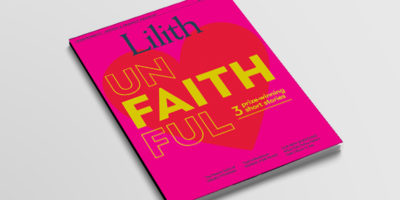The Politics of Women’s History
In the early 1990s, my university department decided that it was time to hire a historian of American women. Back then, our faculty of a dozen included just three women, and each of us sat on the margins of the department. I taught for Jewish Studies, a program outside the unit. Another’s appointment was part-time, the third was a university administrator. Hiring a senior women’s historian, I thought, would transform our faculty.
We invited a string of the field’s pioneers to campus. I was starstruck. I sat up late at night reading their books and manuscripts and took copious notes during their lectures.
After they left I sat, as usual, quietly, at the far edge of our conference table while my male colleagues reflected loudly on the candidates. They raised pointed questions about the manuscripts that had so engrossed me, and criticized talks where I had scribbled extensive notes. In the end, we extended a number of invitations to join our faculty, and then watched as these female scholars brilliantly used our offers to negotiate better counter-offers at their home universities. I am proud to say that my department advanced the status of women’s history in an unexpected way, upping the ante for some of its pioneers.
I still remember a personal encounter with one. At the time, I was researching my book Women Who Would Be Rabbis. I approached her tentatively, knowing that she was Jewish, and mentioned my interest in American Jewish women’s history. She retorted: There’s no such thing. I should not have been taken aback. One of her pathbreaking works had utterly ignored Jewish women when they should have been included, although later editions rectified that. I doubt that she remembers our brief encounter, but I have never forgotten it.
That conversation planted the seeds for America’s Jewish Women: A History from Colonial Times to Today (W.W. Norton, $28.95), a book I have been thinking about writing for much of my life. Sometimes a book that has had a long gestation comes into the world at a propitious moment. This is one of those moments.
For the pioneering scholars of women’s history who visited my department so long ago, writing women into history was their contribution to the feminism surging since the 1960s. By shedding light on women’s lives in the past, historians were uncovering a heritage to buttress a social movement that they expected to transform the world they knew. They were not the first historians to write with political purposes, nor would they be the last.
With the election of Donald Trump, it has become clearer than ever that for millions of women the world has not changed enough. Consequently, women have been raising their collective voices louder than they have in decades.
In the new women’s rights’ groundswell underway, Jewish women unexpectedly nd themselves caught in the cross-hairs,with anti-Semitic rhetoric on the left—including the feminist left—at the same time that a right wing white supremacist kills Jews praying on Shabbat morning, purportedly yelling as he opened fire, “All Jews must die.” We Jews are horrified and also confused. One of my students writes: “I always thought Jews were a religion. Now I hear that we are a race. What are we?”
America’s Jewish Women answers her question. Here we read about Jewish women from the past struggling with the same conundrum and coming up with different answers. We discover our grandmothers and great- grandmothers striking for labor rights, marching for civil rights, and demanding women’s rights. Understanding their anger and activism gives ours of today context and history. We learn about the famous women whose lives made headlines for these causes and also about the many Jewish women whose lives spread over smaller canvases, among their families, their neighbors, and their local communities.
In writing America’s Jewish Women I emulated the earlier generation of women’s historians with their political agenda. Like them, I believe that the past illuminates the present. Knowing where we have been, standing on the shoulders of those who came before us, enables us to strategize about how to move forward.
But mostly, America’s Jewish Women is a long overdue rejoinder to that distinguished scholar I met as an awestruck young professor. It proves beyond a doubt that America’s Jewish women have a history of their own.
Pamela S. Nadell holds the Patrick Clendenen Chair in Women’s and Gender History at American University.


